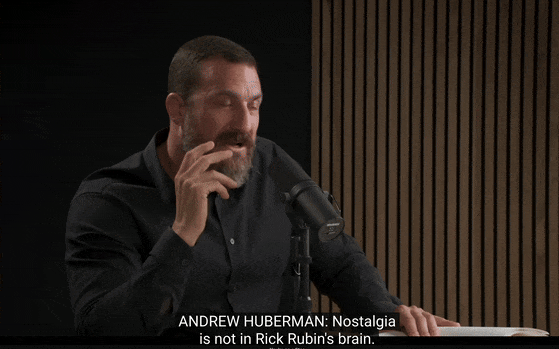No Looking Back
The term 'nostalgia,' originally coined by physician Johannes Hofer, referred to the intense homesickness experienced by Swiss mercenaries in the 17th century. Derived from the Greek words 'nostos' (return) and 'algos' (pain), nostalgia has evolved to describe a broader yearning for the past—encompassing moments, experiences, and emotions. This complex emotion influences our decisions and mental states across both personal and professional realms.
Personally, I have a mixed relationship with nostalgia, a sort of a double-edged sword. On one hand, it provides a comforting bridge between my past and present selves, serving as a reminder of my capabilities and achievements through my brag book practice. However, the glorification of the past has also held me back from learning new tools and stubbornly going down obsolete paths.
That’s why my mind was blown to hear Rick Rubin, the legendary producer and author of The Creative Act, declare that he has no nostalgia whatsoever on a Huberman Labs interview. Rubin’s focus is relentlessly set on the present and future, edging out any longing for the past in favor of continuous innovation and adaptation.
This was the highlight for me in the entire three-hour podcast. It’s only three minutes long and totally worth a quick listen (see link above).
It’s important to note that he does not say what is new is better or worse. It just is. There is no judgment, simply objective evolution. This is a fascinating Zen-like approach* to life that’s both inspiring and terrifying to someone like me, who holds the past in special regard.
This made me think about learning and art in our fast changing world. For people like Olivia who grew up in Internet ubiquity, traditional methods like books may be too time consuming to digest. However, if it's in a short video or song, it becomes easier for her to grasp. We live in an era transitioning from "cold mediums" like books, which require active engagement and interpretation, to "hot mediums" like videos that blur the lines between education and entertainment into “edutainment”.
Yet I can’t help but feel like we're losing patience and attention spans. Classic novels like Dune may not have seen the light of day given their slow build up. But Rubin might say that the competition has just gotten fiercer and we're just using new tools to reach more people. Hence Dune itself has been recreated into main stream movies.
In philosophy, Kanho Yakushiji, a Buddhist monk, takes traditional mantras and transforms them into modern music. Ryan Holiday similarly helped revive thousands-year-old Stoic ideas through podcasts and Instagram reels, proving that while the ideas remain timeless, the mediums of their delivery have transformed to meet contemporary needs.
Facing the dawn of artificial intelligence adds another layer to this complex landscape. As a creator, my craft is the first to be disrupted because ChatGPT can generate essays, images, and (very soon) videos in mere seconds - something that takes me hours to produce. Indeed, I did go through a brief existential crisis. Yet taking Rubin’s mindset has allowed me to lean into change rather than giving into fear. The key is not only recognizing the parts that could, but should be automated.
My experiences and lessons are uniquely human. A machine cannot live them for me. Yet the creation of hot mediums and delivery mechanisms can be eased through technology, thereby reducing the time from lived experience to producing useful content for those I serve.
This is where I can stand behind AI. But without being grounded in my values and purpose, I would be swept up in the hype, hide underneath a rock, or rage against the machine. All these paths lead to me losing my agency, inner peace, and ultimately, ability to make sound decisions.
I’ll leave you with a few questions that I am actively exploring. How does nostalgia influence your life? Is your relationship with the past enriching or hindering your present and future? How might someone without any attachment to the past like Rick Rubin view the rapid changes around us—as threats, opportunities, or with calm acceptance? I look forward to hearing your perspective!
* While Rick Rubin never states that he follows Zen Buddhism, he nevertheless embodies many Zen principles of non-attachment. Rubin’s book The Creative Act is in fact written in the style of Zen parables or koans.
It’s interesting to note that as someone who doesn’t harbor any nostalgia, he works with many artists who harnesses it to create powerful music. In this way, he acts a perfect mirror without distortions for other artists to reflect back their emotions. On that note, I should also differentiate ‘nostalgia’ from ‘reflection’, which is one of my primary adaptation tools.
Make the most of your mind maps
Thanks for reading this article. If you found it useful, you can get a new mind map in your inbox every week. Epiphany is your dose of structured thinking and ordered chaos.

